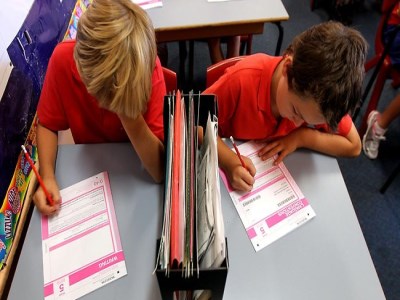
NAPLAN is now over for 2017. The world didn’t stop spinning, there were no major incidents and the vast majority of students, parents and teachers rightly treated NAPLAN for what it is – a series of short tests designed to gain valuable information on how Australia’s students are doing in the fundamentally important areas of literacy and numeracy.
Results will be out later in the year, in around 10-12 weeks, when we will get information back to parents and schools about how students performed on this year's tests. When NAPLAN moves online this timeframe will be significantly reduced.
It has now been a decade since NAPLAN was introduced. The annual assessment is mainly seen as a routine, but important, part of the school calendar. And that’s the way it should be.
Although less prevalent now than in the early years of NAPLAN, we do continue to hear the same NAPLAN myths repeated. I feel it is important to again dispel some of those common misconceptions:
NAPLAN doesn’t add any value – my child already takes tests at school
NAPLAN is a valuable tool for educators and parents to see how well Australia’s children are going in relation to literacy and numeracy standards. NAPLAN is a point-in-time snapshot assessment of students’ achievements in these areas. As a nation-wide assessment, NAPLAN doesn’t replace the assessment activities that are regularly held in classrooms, rather it complements these assessments, adding a valuable national dimension.
Many school principals have actively voiced their support of NAPLAN. As in previous years, during this year’s NAPLAN testing, principals were commenting that the testing provides teachers and schools with data and valuable information that is used as intended – to target teaching both for groups of students and individuals.
There’s no point in my child taking NAPLAN
As we know, literacy and numeracy are fundamental skills every child needs in life to succeed. NAPLAN doesn’t test everything that happens in a classroom – it isn’t intended to – but it does look at the critically important areas of literacy and numeracy. NAPLAN is a check on these areas – to see how each student is going, to see who is excelling, and to see who might need more help. Who wouldn’t want to know if a child is falling behind in a certain area? Reading, for example. That way help can be offered to them. No students should be left behind or overlooked in gaining essential literacy and numeracy skills.
NAPLAN causes anxiety and stress
NAPLAN is not the first, nor the last, test a child will take. It’s true, some students may feel anxious about NAPLAN, but it’s up to the adults in children’s lives to help keep NAPLAN in context. It’s a test that is taken four times in a child’s school life. Over three days, there are four tests, which take around one hour each. NAPLAN tests what students should learn through everyday teaching. Testing students’ literacy and numeracy skills is not new, states and territories had testing programs in place for many years before NAPLAN was introduced, it’s just that NAPLAN provides a national assessment and a national perspective.
While I regret any case of stress experienced by a young person as a result of NAPLAN, I can only wonder how it compares to the ongoing stress felt by young people and adults who do not possess the literacy and numeracy skills necessary to continue learning at, and beyond, school.
NAPLAN data published on My School creates league tables
My School is not about league tables. There are no league tables on the website and ACARA does all it can to avoid the publication of league tables. In fact, My School and the data provided on it has enabled us to identify schools that are demonstrating gain and celebrating cases of above average gain.
Parents can use My School as one source of information about their child’s schooling, alongside other sources. Parents can make comparisons between their child’s school and others catering for students with similar backgrounds.
Overall, NAPLAN is about driving improvement in our schools. The valuable data gained is used for forward planning, allocating support and resources and tracking the progress and achievements of individual students, as well as entire groups of students, over the course of their educational journey.
The data from NAPLAN is used to make sure we are doing our very best to give every Australian child the skills to thrive, by equipping them with essential literacy and numeracy skills.
The biggest failure would be if we were not monitoring how our children are going in these areas. An illiterate or innumerate child will not be a successful adult.
Robert Randall is the CEO of the Australian Curriculum, Assessment and Reporting Authority (ACARA)


